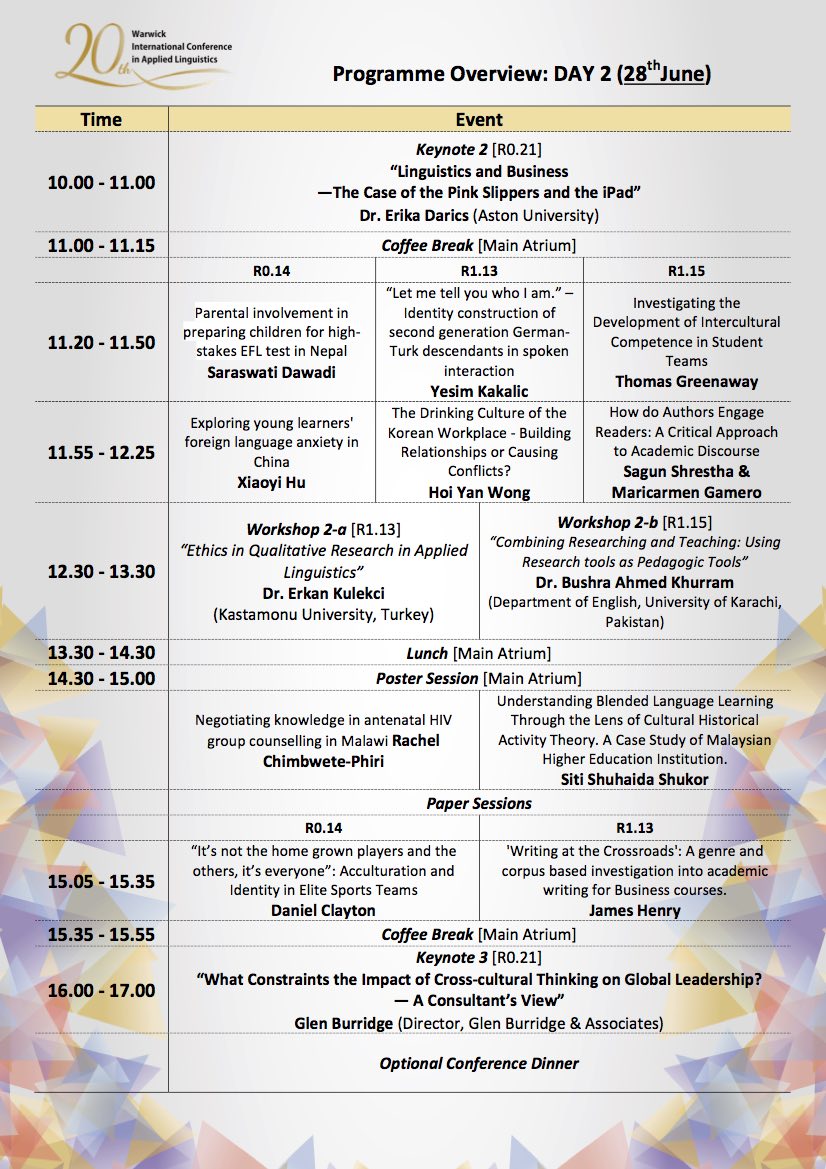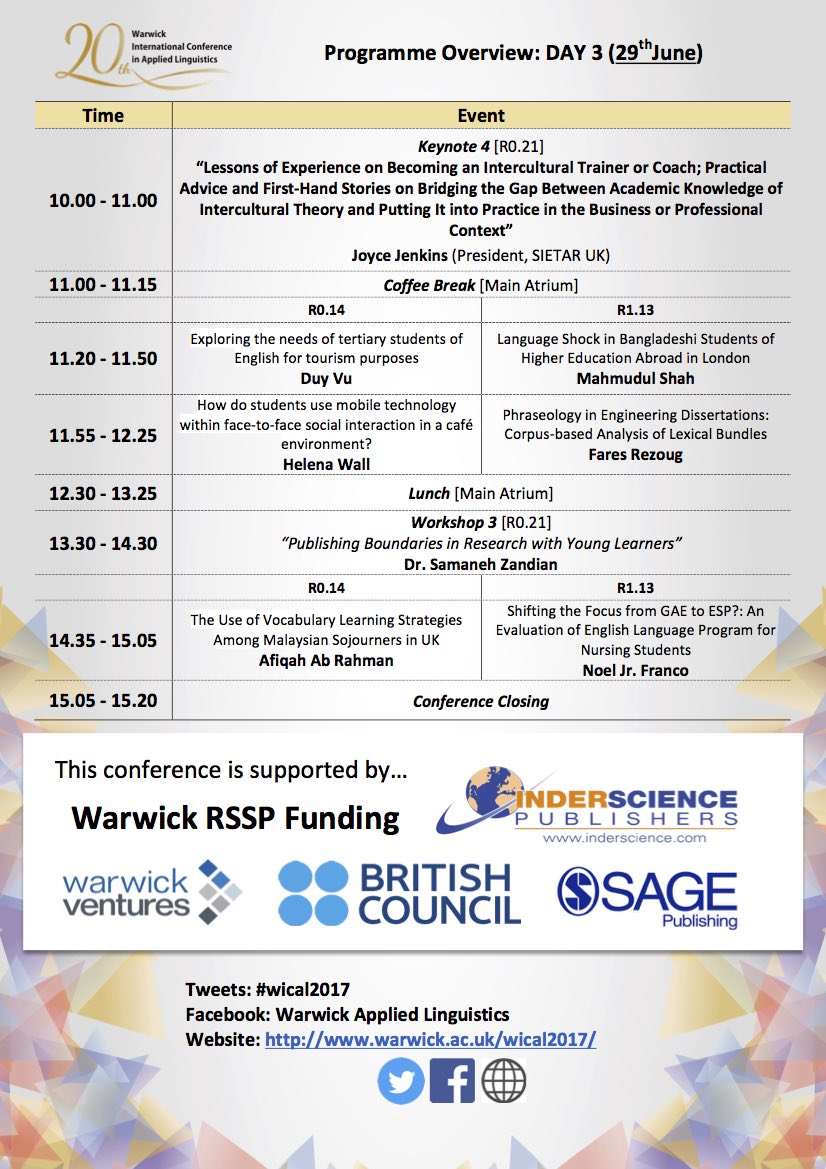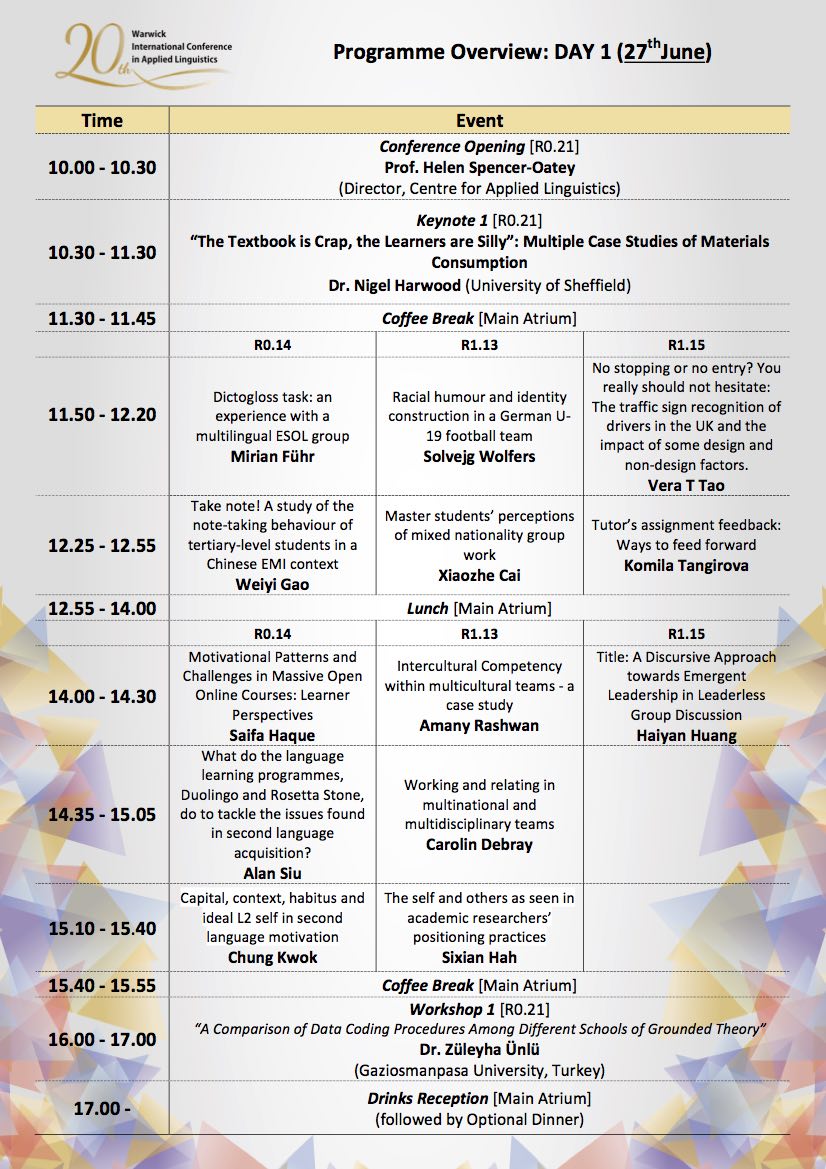Conference Programme
Download PDF version HERE


Keynote Sessions
- Dr Nigel Harwood (University of Sheffield): DAY 1 (27th June)
- Dr Erika Drics (Aston University): DAY 2 (28th June)
- Glen Burridge (Glen Burridge & Associates Ltd.): DAY 2 (28th June)
- Joyce Jenkins (President, SIETAR UK): DAY 3 (29th June)
Workshops
- Dr Samaneh Zandian
Title: Publishing Boundaries in Research with Young Learners
When the participants of research are children, certain important issues arise due to the different way in which children experience the world and the way they communicate. In this workshop, I discuss some of these issues. My PhD research project aimed to explore how children who study at primary level in Iran understand intercultural issues. This study consisted of 3 phases: designing child-friendly research instruments, data collection, and sharing the data with the child- participants. The participants of this study were 10-12 years of age, and the data collection was via the administration of 294 ‘child-friendly’ questionnaires and conducting five group interviews. Each interview consisted of three participatory activities. In this interactive workshop, I share two aspects of my study: The participatory activities and the follow-up sessions. First, I describe the innovative participatory research methodologies used in the study and invite the audience to take part in the same activities. Then, I will lead a discussion about objectives, advantages and challenges of including participatory activities in qualitative research with children. Second, I focus on the last phase of the study, the follow-up sessions, in which the initial findings of the study were shared with the child-participants. One of the highlights of revisiting the participants was children’s abundant unsolicited comments and spontaneous questions. Most of the comments were unexpected and emerged from children’s amazement after some parts of the findings were shared with them in the format of interview transcripts. I explain how these follow-up sessions opened up a transformational space where both the child participants and the adult researcher developed better understandings about research processes and relationships. I point out that such retrospective reflection can facilitate exploring children’s post hoc interpretations about the research, in addition to developing researcher reflexivity.
- Dr Züleyla Ünlü (Assistant Professor at the Department of English Language and Literature, Gaziosmanpasa University, Turkey)
Title: A Comparison of Data Coding Procedures Among Different Schools of Grounded Theory
Grounded theory (GT) is a method for generating theory by following a systematic, iterative, and rigorous data collection and analysis process (Glaser, 1978). There are basic principles which any study falling into GT tradition needs to follow. These are constant comparison method, concurrent data collection and analysis, absence of a clear research problem at the start of the study, memo writing and theoretical sampling. Despite these basic components of GT studies, differing perspectives on theory generation among pioneers of GT may create confusion for novice GT researchers in terms of coding the data. In this workshop, I will focus on different schools of GT while also detailing how each school approaches data coding at different stages. In the first part of the workshop, I will present the basic principles of GT as well as clarifying what each principle means. The second part will inform the participants about what coding means. In this part, the participants will be given a small data sample merely to practice coding. In the third part, I will focus on major GT schools and their data coding approaches at different stages in a comparative way. Following this, the participants will be given a small data extract to practice coding according to different GT schools. The participants will be encouraged to share their opinions and questions on each way of coding during the practice session. Although the workshop mainly addresses the very beginner level researchers working with GT, all participants regardless of their background are welcome to this workshop.
- Dr Erkan Kulekci (Assistant Professor at the Faculty of Education, Kastamonu University, Turkey)
Title: Ethics in Qualitative Research (in Applied Linguistics)
Qualitative research is ‘a person-centred enterprise’ (Richards, 2003, p.9) and it involves a fluid, flexible and mostly iterative research process (Dörnyei, 2007). In order to provide rich and complex data, qualitative research focuses on the meanings embedded in people’s experiences and it often requires the researcher to be a good communicator who is able to empathise with respondents and establish a good rapport with them. In this process, the researcher may need to take some moral principles into consideration to decide what is right and wrong. Research ethics, in a broader sense, refers to ‘the moral principles and practices guiding research, from its inception through to completion and publication of results and beyond’ (ESRC, 2017). The aim of this workshop is to discuss ‘research ethics’ in terms of qualitative research, particularly in Applied Linguistics.
The workshop consists of three main parts. First, I will describe qualitative research and ethics in general and talk about the nature of the relationship between them. I will also present the conceptualisation of research ethics in the literature through existing models and frameworks. Second, the participants will be given some specific cases including widely encountered ethical issues in the conduct of qualitative research, and they will be encouraged to share their opinions and propose possible solutions for them. Finally, the participants will be asked to come up with a short list of possible ethical issues and dilemmas arising from their research process. Here, they will also have the opportunity to share their own experiences regarding research ethics. At the end of this workshop, the participants are expected to have a clearer understanding of both the theoretical and practical aspects of research ethics in qualitative studies.
- Dr Bushra Ahmed Khurram (Department of English, University of Karachi, Pakistan)
Title: Combining Researching and Teaching: Using Research tools as Pedagogic Tools
This activity based session offers combined ‘theoretical’ and ‘practical’ opportunities for understanding the research tools, namely reading test, reading questionnaire, think aloud protocols and learners’ diary, I used during my action research study. Starting from reflection on the purposes I used these research tools for, participants will be guided to understand how these research tools could be used during a study. Moreover, the session discusses the possibility of linking teaching and researching as part of the same process and illustrates that research tools could primarily be pedagogic tools as they could raise students’ awareness and help them reflect and understand better the learning process or their progress as part of data collection as proposed by Ushioda and Smith (2012).

